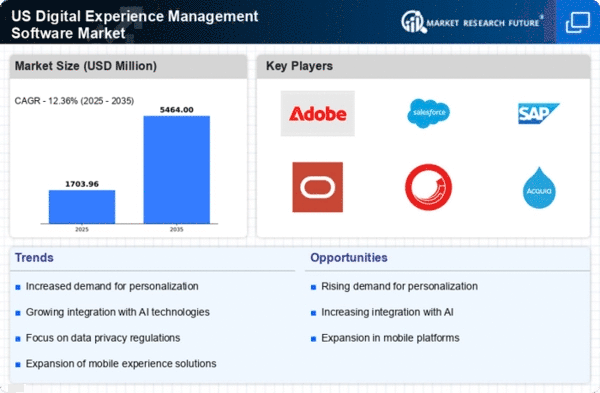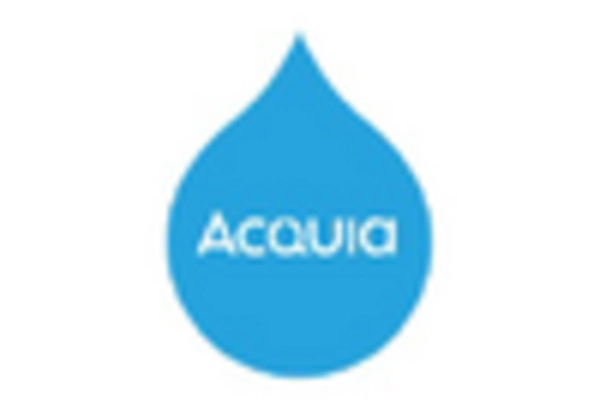Expansion of Digital Touchpoints
The digital experience-management-software market is experiencing growth due to the expansion of digital touchpoints across various industries. As businesses increasingly adopt digital channels for customer engagement, the need for effective management of these touchpoints becomes paramount. The proliferation of mobile applications, social media platforms, and e-commerce websites necessitates a cohesive strategy to ensure consistent customer experiences. Recent statistics indicate that organizations with a well-integrated digital presence can enhance customer satisfaction by up to 25%. This trend is driving the demand for software solutions that can seamlessly integrate multiple channels and provide a unified view of customer interactions. As companies seek to optimize their digital touchpoints, the digital experience-management-software market is likely to expand, offering innovative solutions to meet the evolving needs of businesses.
Emphasis on Enhanced Collaboration Tools
In the digital experience-management-software market, there is a notable emphasis on enhanced collaboration tools that facilitate teamwork and communication within organizations. As remote work becomes more prevalent, the need for effective collaboration solutions has intensified. Businesses are increasingly seeking software that allows teams to work together seamlessly, regardless of their physical location. This trend is supported by data indicating that organizations with strong collaboration practices can experience a 30% increase in productivity. Consequently, the demand for digital experience-management software that incorporates collaboration features is on the rise. These tools enable teams to share insights, manage projects, and coordinate efforts more effectively, ultimately leading to improved customer experiences. The focus on collaboration is likely to shape the future of the digital experience-management-software market, as organizations prioritize tools that enhance teamwork and drive innovation.
Growing Importance of Real-Time Analytics
The digital experience-management-software market is increasingly influenced by the growing importance of real-time analytics. Organizations are recognizing the value of immediate insights into customer behavior and preferences, which can inform timely decision-making. Real-time analytics allows businesses to respond swiftly to changing customer needs, enhancing the overall user experience. Data suggests that companies utilizing real-time analytics can achieve a 20% increase in customer engagement. This trend is prompting a surge in demand for software solutions that offer robust analytics capabilities. As businesses strive to remain competitive, the ability to analyze data in real-time becomes a critical factor in shaping customer interactions. Consequently, the digital experience-management-software market is likely to see continued growth as organizations invest in technologies that enable real-time data analysis and actionable insights.
Rising Demand for Personalized Experiences
The digital experience-management-software market is witnessing a notable increase in demand for personalized customer experiences. Businesses are increasingly recognizing that tailored interactions can significantly enhance customer satisfaction and loyalty. According to recent data, companies that leverage personalized marketing strategies can see conversion rates increase by up to 10%. This trend is driven by the need to engage customers on a deeper level, utilizing data analytics to understand preferences and behaviors. As organizations strive to differentiate themselves in a competitive landscape, the adoption of digital experience-management software becomes essential. This software enables businesses to create customized content and interactions, thereby fostering stronger relationships with their customers. The emphasis on personalization is likely to continue shaping the digital experience-management-software market, as companies seek to optimize their customer engagement strategies.
Increased Focus on Customer Journey Mapping
In the digital experience-management-software market, there is a growing emphasis on customer journey mapping as organizations aim to enhance user experiences. By visualizing the customer journey, businesses can identify pain points and opportunities for improvement. This approach allows for a more strategic allocation of resources and efforts to optimize each touchpoint. Recent studies indicate that companies that actively map customer journeys can improve customer retention rates by as much as 15%. As a result, the demand for software solutions that facilitate effective journey mapping is on the rise. These tools provide insights into customer interactions across various channels, enabling businesses to create seamless experiences. The focus on customer journey mapping is likely to drive innovation and investment in the digital experience-management-software market, as organizations seek to refine their strategies and enhance overall customer satisfaction.
















